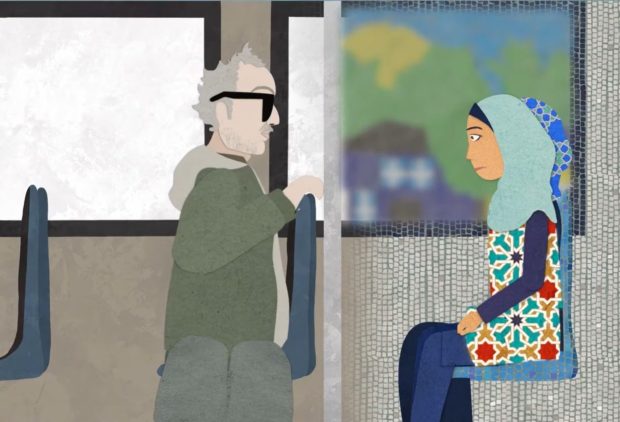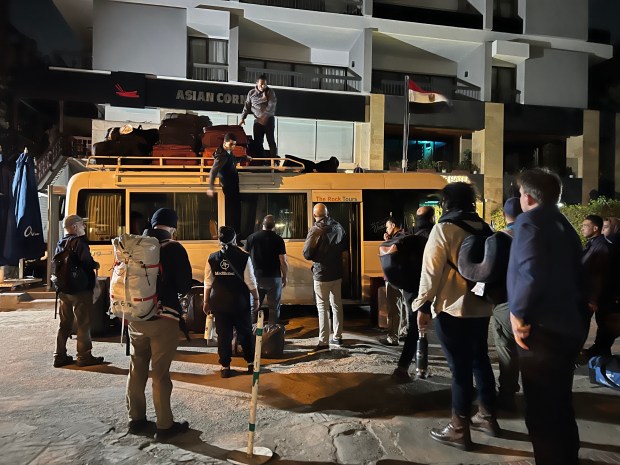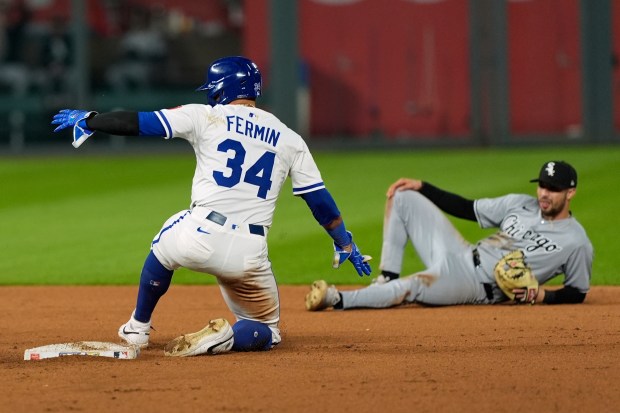At a time when Palestinian existence and resilience are under a microscope, the Chicago Palestine Film Festival is spotlighting all aspects of Palestinian culture and tradition with the 24th annual event, which began Saturday.
Much of the film festival, which runs through April 26, takes place at the Gene Siskel Film Center and includes many screenings as well as panel discussions and social gatherings.
Nina Shoman-Dajani, executive director of Chicago Palestine Film Festival, said the event is known for showcasing work from “Palestinian filmmakers who focus on Palestine, the history and the lived experiences of the Palestinian people living under military occupation.”
The festival is also an opportunity to promote the “Palestinian experience in the diaspora around the world, the everyday experiences of Palestinians just living their lives from Chicago to Gaza,” Shoman-Dajani said.
“Not all films that we screen focus on the occupation or what’s happening in Gaza,” Shoman-Dajani said at a time when Israel has resumed bombing and ground operations in Gaza after a two-month cease-fire.
“We also feature films that celebrate the Palestinian joy and culture and traditions and music and art,” she said, “and uplifting the Palestinian lived experience is a critical part in the work that we do.”
Films submitted to the festival for consideration vary from pieces by local filmmakers to internationally-acclaimed projects, Shoman-Dajani said. About 40 films will be screened this year, ranging from shorts to narrative features, documentaries and animated works.
Some of the screenings are already sold out, and a few of the films will have encore screenings later in April and May.
As a first-generation Palestinian American, Shoman-Dajani said she feels a responsibility to her people to keep their stories alive.
“I love the opportunity to share the stories of my ancestors and my community with the world and honor them through the work that I do with the film festival,” she said. “It’s more critical now than ever that we uplift the lived experiences of the Palestinian people, especially during this time when there seems to be a focus on the erasure of Palestinian stories and narratives.”
Jameeleh Shelo, a Chicago native, is a film producer and former executive director of the Chicago Palestine Film Festival. She co-executive produced “Khsara” with fellow Chicagoan Dean Bushala, a film and TV director who has worked all over the world with organizations such as National Geographic, Discovery Channel and Disney.
The Emmy-nominated documentary short follows three doctors who were given compact cameras to film their experiences as they traveled to war-torn Gaza a little over a year ago to assist with humanitarian aid and relief efforts.
Bushala said the film shows how the rules of war have changed. “What we’re seeing now is violence toward medical aid, hospitals, those areas that were considered safe, but that’s not the case anymore,” he said.
The film was meant to “touch people’s hearts and minds,” Bushala said, and the festival is an opportunity to do just that while also being a place where “filmmakers live and breathe.”
Shelo said she submitted the short film to the festival “quietly,” not wanting any special treatment for having been a part of the organization previously. She added that she wasn’t sure the film would be selected because “so many amazing films” were submitted.
“The festival has grown so much,” Shelo said. “It’s incredible to see and be a part of, even now from this side as a filmmaker and supporter.”
Shelo said the festival is also a “powerful” expression and a chance to move away from any “victim narrative” associated with Palestinian people.
Palestinian resistance takes many forms, she said, and “one of the more impactful ways is film,” despite the likelihood of backlash, she said, referring to an attack on Hamdan Ballal, co-director of the film “No Other Land,” which he made in collaboration with an Israeli filmmaker. Ballal was beaten by Israeli settlers and detained by the Israeli military a few weeks after his film won an Oscar for best documentary feature.
“I think Palestinians understand the risk that we take when we tell our stories because our truth is actively being suppressed,” she said. “We recognize that if someone who is at the top of their field, an Oscar winner, can have this happen to them, then we need to be stronger and we need to keep pushing back so it doesn’t happen to anyone else.”
Naif Salem, who was born and raised in Chicagoland, said being Palestinian is his “entire personality.”
His animated short film, “The Olive Tree Said To Me,” is based on his children’s book of the same name that features a young girl learning about the olive harvest in Palestine. He said he chose to write children’s books about Palestinians after seeing the lack of such books in the market. His fourth book is expected to come out later this year.
“Making sure our stories are out there is huge to me, and I want to continue sharing these stories and elevating the voices of our community,” Salem said. “We just have to keep telling the stories because if we don’t, no one else will.”
He said seeing that several of the festival’s screenings are already sold out energizes and excites him and he hopes the festival can “continue to grow and become something even bigger and better in a beautiful way.”
Bayan Jarad, a Palestinian Chicagoan and a graduate of Columbia College, has a film being screened. In “Memoirs of a Mozlem,” which was Jarad’s capstone project for her animation degree, the main character is “an echo of myself,” she said, and the film draws on Jarad’s experiences with bigotry during her college days.

“The hate that she receives doesn’t make her hateful toward others,” Jarad said. “She doesn’t let it get her down and ends up having a positive experience that reassures her that there are people out there who are kind.”
She said she is proud that her animated short film will be screened among a pro-Palestinian audience and hopes the film can cast a wider net to garner even more support for Palestinians.
The theme for this year’s film festival is “rooted in the Palestinian harvest,” Shoman-Dajani said, paying homage to the land and all that is harvested from it.
Besides the annual film festival, the organization puts on events throughout the year at campuses and community centers and in collaboration with other groups to promote conversation through the arts.
Shoman-Dajani said people “don’t need any prior knowledge to come and check out one of our films” at the festival, with its welcoming environment and diverse, multigenerational audience.
“The best way to understand what we do is to come and see a film and experience it,” she said.
Most people don’t just watch a film and leave, Shoman-Dajani said.
“It’s an opportunity to engage with the community, to network, to come together with like-minded individuals who believe in sharing the Palestinian narrative,” she said. “It’s also a chance to educate the public about what’s happening in Palestine, but also to share the everyday stories of the Palestinian people.”




